- Home
- Buying firewood
- Hardwood Vs Softwood
Hardwood vs Softwood
This post may contain affiliate links so I earn a commission.
When comparing hardwood vs softwood it's important to understand that all firewood is not equal.
Specific burning characteristics like heat generation, coaling qualities and lighting ability should all play a role in deciding which type of firewood will work best for you.
For starters, what will be the primary use for your firewood?
Do you plan on having an occasional campfire or will you be using the wood as your primary heat source?
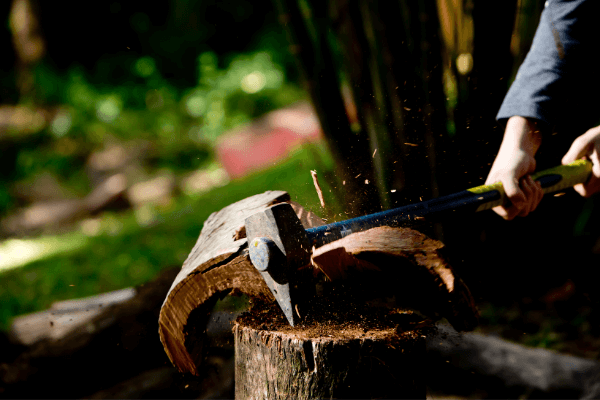
Since hardwoods burn longer they work better for overnight heating and will usually have coals left over in the morning so you can quickly restart your fire.
Are you going to buy all of your firewood from a local dealer or do you plan on cutting your own?
Softwoods should be cheaper than hardwoods, so if you're paying the same price you should find a new supplier.
To help you decide which type to burn let us compare the two a little closer.
Identifying Hardwoods vs Softwoods
Hardwoods are flowering plants. All hardwood trees produce flowers and enclose their seeds in a fruit.
Hardwoods also have a seasonal life cycle.
Their leaves fall during the fall season, and they get dormant during winter.
Their leaves are mostly broad and flat. They also have a slower growth rate than softwoods.
Softwoods do not produce flowers, and their seeds are enclosed in cones.
Softwoods are usually evergreen. Their leaves are scale-like or needle-like and do not shed during the cold seasons.
They have a fast growth rate and are usually less dense.
The Basics Of Burning Firewood
The most crucial rule to keep in mind when assembling firewood, regardless of the type of tree you choose, is ensuring that it is well-seasoned.
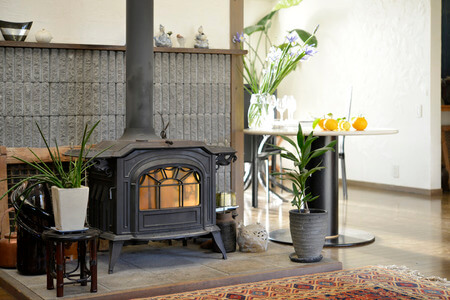
Unseasoned wood will not burn effectively.
Waterlogged firewood is hard to light and will produce fire with less heat compared to seasoned wood.
Never burn painted or treated wood because it can be hazardous.
Burning Hardwoods
Generally speaking, the easiest way to identify a hardwood is by its leaf type.
Hardwoods have a broadleaf and they will typically lose their leaves in the fall.
The group consists of many different species of trees, but some of the most common and popular types are oak, maple, beech, ash, and elm.
Hardwoods are often considered to be superior firewood when comparing hardwood vs softwood because the wood is very dense.
The dense wood creates a hot, long lasting fire without a lot of smoke or sparks.
The wood also creates hot coals which give out radiant heat for a long period of time.
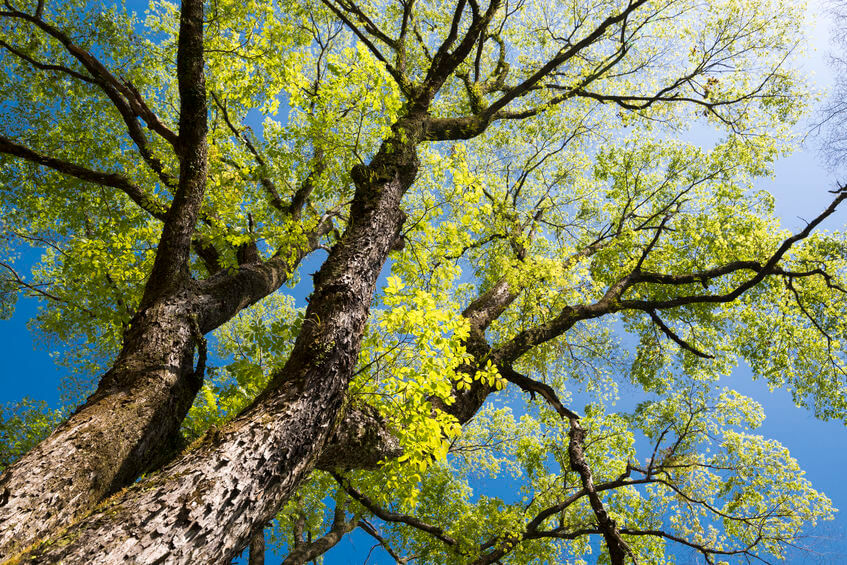 Elm Tree
Elm TreeWhen purchased by the cord (128 cubic feet) hardwood will produce more BTUs (British Thermal Units) than a similar cord of softwood.
However, just because the tree is classified as hardwood doesn't necessarily make it the best choice.
For example, a low quality hardwood is actually softer and less dense than a good quality softwood.
Are there any negatives to hardwood?
The dense wood takes longer to season or dry out (typically between 1-2 years), and it's harder to light compared to softwood.
You can also expect to pay more for hardwood compared to the same amount of softwood.
Burning Softwoods
Softwoods such as evergreen trees or conifers can be identified by their distinct needles and pine aroma.
Cedar, red pine and fir are all popular species of trees classified as softwoods.
Softwoods grow very fast compared to most hardwoods resulting in a much lighter, less dense piece of wood.
This lightweight wood is typically very resinous, which allows the wood to light easily and burn hot and fast.
A fire built from softwoods will usually have large flames that crackle and spark.
Softwoods season faster than hardwoods and light much easier which makes them a popular choice for kindling.
In fact, cedar is one of the best sources of kindling available.
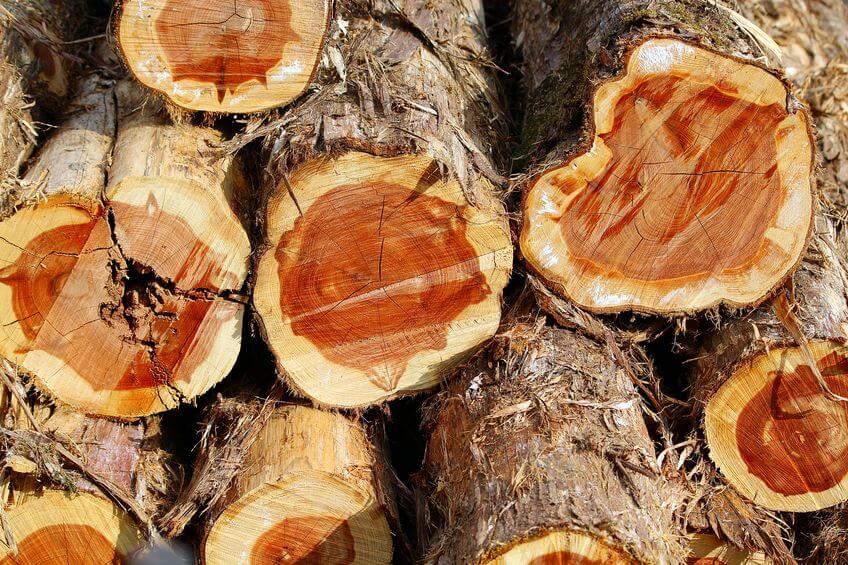 Cedar Logs
Cedar LogsOne disadvantage of softwoods is the amount of smoke they create and they leave behind fine ashes with little to no coals.
With poor coaling qualities, softwoods are not good for overnight burning in a wood stove because the fire will likely be out with no hot coals left over to restart it.
Besides kindling, softwoods are great for campfires because they burn quickly and produce a nice large flame.
They also work great when mixed with hardwood to help freshen up a slow-burning fire.
If you have a modern stove, you can expect to get a longer burn time from seasoned softwood firewood.
Modern stoves are more efficient than older stoves and minimize particulate emissions.
Whether you choose to burn softwood or hardwood depends on what is available in your area and the purpose of your fire.
Sometimes, the best option is to combine softwoods and hardwoods.
Softwoods are good at starting a fire and then switching to hardwood for a longer-lasting fire.
Hardwood vs Softwood - The Amount Of Heat Produced
Different types of firewood, regardless of whether it's a hardwood vs softwood, can be classified by the heat energy they produce per cord of wood.
The best woods provide heat energy that is equal to 200-250 gallons of petroleum oil. They include:
- White oak
- White ash
- Red oak
- Maple
- Ironwood
- Hickory
- Yellow birch
- American beech
- Apple
The next group of heat energy is equal to 150-200 gallons per cord of wood. These trees include:
- Tamarack
- Red and silver maple
- American elm
- Douglas fir
- Black cherry
- White birch
The lowest heat energy classification produces heat that is equivalent to 100-150 gallons of fuel oil per cord of firewood. They include:
- Sitka spruce
- Redwood
- White and lodgepole pine
- Hemlock
- Cottonwood
- Red cedar
- Aspen
- Red alder
Firewoods to Avoid - Hardwood vs Softwood
Scavenged firewood can save you money, but there are some woods that you should avoid for your safety and health reasons.
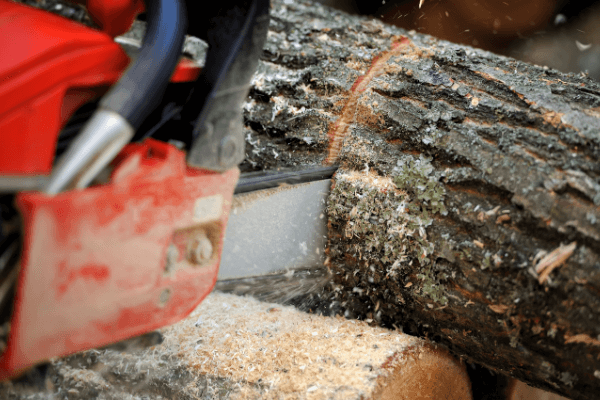
Most of these will emit hazardous fumes in your house and fumes that would harm the environment.
Some woods also cause potential hazards to your fireplace or can cause creosote to accumulate in your chimney.
For your health and safety, avoid burning:
- Compressed paper products and hardboards
- Engineered wood products, such as plywood and particleboard
- Driftwood
- Pressure-treated wood
- Painted or polished wood
If you experience allergies, some firewood, especially aromatic ones, should also be used cautiously.
Your safety should be your priority when it comes to burning firewood.
Always adhere to the recommended clearances and protect your fireplace with a fire-resistant pad.
Overall - Hardwood vs Softwood
When comparing hardwood vs softwood, it's the density of the wood that makes all the difference.
Pound for pound hardwood vs softwood will create about the same amount of heat.
However, due to the difference in density, you may need twice the volume of softwood to compare to the same weight as hardwood.
More volume means more cutting, splitting, and stacking.
This is why many people choose to burn hardwood over softwood if given the opportunity.
However, these two different types of wood provide different benefits.
They complement each other.
Softwoods are better at building a fire, while hardwoods are better at sustaining the fire.

About the Author
Obsessed with firewood, Nick is behind over 350+ of Firewood For Life's articles, as well as countless reviews, guides and YouTube videos to help readers like you reduce heating costs and create the perfect fire.


